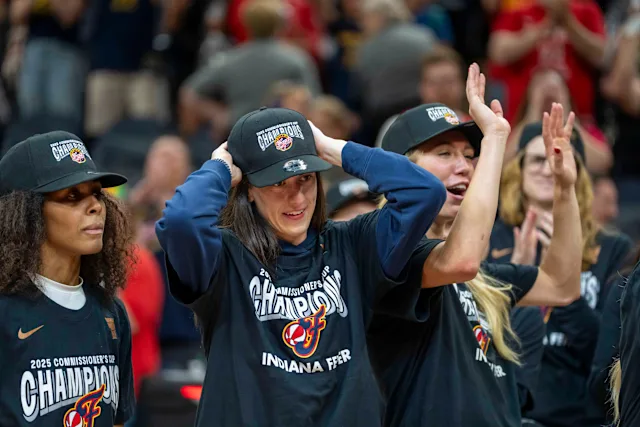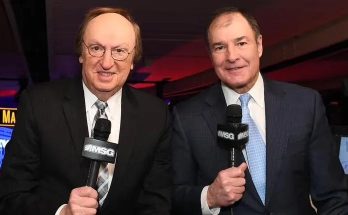Caitlin Clark, the Indiana Fever’s rookie sensation and already a galvanizing force in women’s basketball, has never been one to hold her tongue. And on a night when she should’ve been celebrating competitive fire, team effort, or another key moment in her debut WNBA season, Clark chose instead to speak up about an issue simmering beneath the surface: money—or, more accurately, the way it’s being distributed within the WNBA.
Her comment was sharp, pointed, and unmistakably bold: “Someone tell Cathy to help us out.” The “Cathy” in question is WNBA Commissioner Cathy Engelbert. Clark was referring to the fact that players in the Commissioner’s Cup—a midseason, in-season tournament—stand to make more money in bonuses than they do for actually winning the WNBA Championship. In a league already battling for better pay, investment, and exposure, Clark’s call-out reverberated far beyond the postgame presser.
This wasn’t just a casual gripe. It was a statement. One that reflects the frustrations not only of the league’s newest superstar but of many players who feel the league’s financial priorities need realignment. Clark, a record-breaking collegiate player turned national face of the WNBA overnight, has now firmly inserted herself into one of the most vital off-court conversations in the sport.
The numbers are stark. For winning the Commissioner’s Cup, players receive a bonus of \$30,000 each. That’s significant, particularly in a league where the average base salary hovers around \$147,000 and maxes out at roughly \$242,000. In contrast, the bonus for winning the WNBA Finals? A meager \$11,000. That’s less than half of what a Commissioner’s Cup winner gets—and for a title that, historically, hasn’t carried the same weight or prestige.
The reaction to Clark’s comment was swift. Fans flooded social media with support, praising her courage to speak truth to power. Teammates and players from other teams gave quiet nods or shared subtle affirmations. The broader basketball community, too, took notice. Analysts pointed to Clark’s ever-growing influence and suggested that this moment could mark a tipping point—where star players in the WNBA, empowered by growing viewership and increased media coverage, begin to exert their collective voice for better equity.
Clark’s rise has been meteoric. From her buzzer-beaters at Iowa to her sold-out arenas across the WNBA map, she’s become the face of a league still striving to break through mainstream ceilings. With millions of fans tuning in and media giants placing more focus on women’s sports than ever before, her voice carries unusual weight for a rookie. That’s why this moment matters.
She didn’t just point out a numbers disparity. She put the league’s leadership on notice. And in doing so, she ignited an important discussion: What does the WNBA truly value?
The Commissioner’s Cup was introduced to add spice to the regular season—more competition, more entertainment, more incentive. It’s worked in many ways, adding another layer to the already intense WNBA schedule. But if the monetary rewards for that tournament exceed those of the Finals, it sends a confusing message. Is a midseason showcase truly worth more than crowning the best team in the league?
Clark’s comments bring this contradiction into the spotlight. And it isn’t just about dollars—it’s about legacy. Players don’t grow up dreaming of winning midseason cups; they dream of championships, banners, rings. They endure grueling travel, off-season overseas stints, and packed schedules for the chance to lift the WNBA trophy. Yet the bonus for achieving the league’s ultimate goal falls short of a tournament that many fans still don’t fully understand.
Clark’s critique also speaks to the broader systemic issues in women’s sports. The pay gap between the WNBA and the NBA is well-documented. While NBA champions receive six-figure bonuses and operate within a billion-dollar structure, WNBA players are often left navigating the margins—underpaid, underpromoted, and overworked. Yes, progress has been made—sponsorships are rising, TV deals are improving, and interest is surging. But glaring contradictions like this only underscore how far the league still has to go.
Cathy Engelbert, to her credit, has been a vocal advocate for growth. Under her leadership, the WNBA has expanded marketing deals, increased team valuations, and pushed for charter flights and better travel conditions. The Commissioner’s Cup, in fact, was one of her innovations—a forward-thinking move to drive engagement and financial support. But Clark’s callout suggests that innovation needs a second look. Good ideas need balance. Priorities need to align with what players care about most.
It’s also worth noting that Clark’s comments come at a time when the league is more visible than ever. WNBA attendance is up. Merchandise sales are booming. Media coverage is expanding rapidly. Caitlin Clark herself is a major reason why. Every game she plays brings record-breaking ratings, packed arenas, and unprecedented interest in women’s basketball. In many ways, she’s carrying the momentum of an entire sport on her shoulders—and she knows it.
Her outspokenness is a reflection of that responsibility. She’s not just here to play; she’s here to lead. Even as a rookie, Clark seems to understand that change often starts with those willing to speak up, especially when others are watching.
And they are watching. Networks, sponsors, casual fans, and longtime WNBA followers alike—all tuning in to see what’s next, not just on the court, but in the movement surrounding it. Clark’s boldness opens the door for more players to speak out about inequities. It pushes league leadership to reassess what kind of incentives truly honor players’ sacrifices and achievements. And perhaps most importantly, it forces a reevaluation of how the league balances spectacle with substance.
Of course, change doesn’t happen overnight. But in professional sports, especially ones still fighting for equal footing, it starts with moments like this—when a voice too powerful to ignore speaks plainly. Caitlin Clark’s message may have been brief, almost casual in tone. But its impact was anything but.
It was a rallying cry. A challenge to power. A sign that the new era of the WNBA won’t just be about highlights and headbands—it’ll be about fairness, respect, and real progress.
As the season continues, Clark’s words will echo. They’ll follow Engelbert into boardrooms, fuel debates on sports shows, and likely make their way into future collective bargaining talks. And if they lead to a shift in how rewards are structured in the WNBA—to better reflect the grind, the glory, and the goal of becoming a champion—then Caitlin Clark won’t just have reshaped the game with her shooting; she’ll have redefined what power looks like in women’s basketball.
In the end, this wasn’t just a rookie with a mic. This was a rising icon setting the tone for a league in transformation.
“Someone tell Cathy to help us out.” She said it with a grin. But the message was crystal clear—and it just might change everything.



